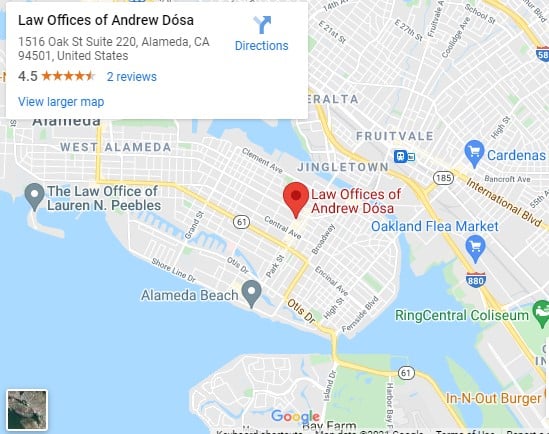No matter where you are in the United States, misdemeanors are crimes punishable by imprisonment and, in some cases, by a sum of money exacted as a penalty or a fine. However, definitions of felonies, misdemeanors, and infractions could vary per State and are defined by their potential penalties.
Infractions, Misdemeanors, and Felonies
Misdemeanors
In California, misdemeanors are less severe than a felony but more consequential than an infraction.
Infractions
Infractions are violations of the law but are not considered crimes, as opposed to misdemeanors and felonies. Committing an infraction will not result in jail time but can have a maximum of $250 fines. Misdemeanors are those that are punishable with a year in local jail or less.
Felonies
Felonies, on the other hand, are crimes that carry a maximum sentence of more than 365 days or one year in custody. When the defendant is sentenced to state prison, the offense is a felony. Still, when the sentence is to county jail, it becomes a misdemeanor. Common misdemeanors are Driving Under Influence (DUI), shoplifting, domestic abuse, or violence with no severe injury outcomes.
Categories of California Misdemeanors
There are two basic categories of misdemeanors in California. The purpose of classification is to appropriate sentences suitable to the level of offense.
Standard Misdemeanors
Misdemeanors that are indictable by up to 6 months in county jail or a fine of up to $1000
Some common misdemeanors are:
- Drug possession (such as cocaine, heroin, and meth) that are considered for personal use
- Drunk in public
- Public Indecency (1st offense)
- Petty Theft
- Prostitution
- Shoplifting or theft of property worth $950 or less (other than a gun)
- Simple assault or battery that doesn’t involve a deadly weapon or result in serious injury
- Assault with a stun gun or Taser.
Gross or Aggravated Misdemeanors
These type of misdemeanors are assessed as more grave than others and are punishable by up to a year in county jail or a fine of $1000 or more
Some of the common gross or aggravated misdemeanors are:
- Domestic Battery
- Driving on a suspended license
- Driving under influence (DUI) without resulting in injury
- Violation of a restraining order
California Wobbler Offenses
In California, certain crimes are called wobbler offenses, named such because they “wobble” between felony and misdemeanor or misdemeanor and infraction.
Under the prosecutor’s discretion, the crime may be charged more or less severely, such as a misdemeanor to a felony called misdemeanor/felony wobblers or a misdemeanor to an infraction called misdemeanor/infraction wobblers. The decision as to when the prosecutor will charge a wobbler offense relies on the factual circumstances surrounding the case and the defendant’s criminal history. When the defendant has a prior conviction for the same crime or another serious or violent felony, a misdemeanor may be punished as a felony.
In California, unless the prosecutor charges a crime as a misdemeanor, all offenses start as presumed felonies. California judges can reduce a felony conviction for a wobbler offense to a misdemeanor at sentencing.
Some of the common misdemeanor/felony wobblers in California are:
- Brandishing a weapon – Under California Penal Code Section 417 PC, it is a crime to brandish a gun or firearm publicly. Depending on the factual circumstances, this offense can either be charged as a felony or a misdemeanor. The charge would depend on the type of weapon, the location where you wielded the gun, and if the brandishing was conducted by police or other peace officer performing a lawful duty.
- Elder abuse – Under California Penal Code 368, inflicting physical or emotional abuse, neglect, endangerment, or financial exploitation, otherwise known as senior fraud or elder financial abuse, upon someone 65 years or older is an elder abuse crime.
- Assault with a deadly weapon – Under California Penal Code 245 (a)(1), the assault upon another person “with a deadly weapon or instrument other than a firearm shall be punished by imprisonment in the state prison for two, three, or four years, or in a county jail for not exceeding one year, or by a fine not exceeding $10,000 or by both the fine and imprisonment.”
On the other hand, some of the common misdemeanor/infraction wobblers in California are:
- Disturbing the peace – Under Penal Code 415, California law defines the disturbance of one’s peace by playing deafening music, getting into fights, or using offensive language as a misdemeanor crime or noncriminal infraction.
Sentencing
Misdemeanors are usually charged with maximum jail sentences but some cases, such as a second-offense DUI, require a minimum jail time. Many factors can influence the actual jail time imposed. There are even instances wherein conviction won’t lead to any jail time. Sentencing laws can be complicated, and choosing the proper criminal defense attorneys is crucial to get the best outcome.
Probation for Misdemeanor
In California, misdemeanor violations may be penalized with misdemeanor probation or summary or informal probation. Mostly lasting for one year unless the crime statute specifies otherwise, defendants must stick to specific stipulations during the misdemeanor probation to avoid imprisonment. The demands and provisions may include community service, house arrest, payment of victim restitution, and attending counseling sessions or treatment programs.
Getting Legal Assistance
If you’re facing criminal charges in California, you should speak with a criminal defense lawyer as soon as possible. The factual circumstances are vital factors to consider. A criminal defense attorney can explain how the law applies to your situation and significantly improve your chances of undergoing probation instead of going to prison. You may also want to discuss with a lawyer a request to dismiss or clear your criminal record or request to reduce a felony to a misdemeanor.
Having an experienced California criminal lawyer on your side would boost the chances of a favorable result. Facing criminal charges can be traumatizing and stressful. Still, with the right legal experts on your side, you can manage the situation.



